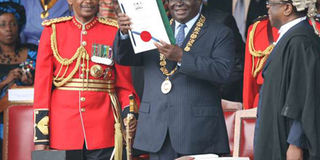Struggle for freedom is a lifelong project

President Mwai Kibaki displays the Constitution on August 27, 2010. But are Kenyans any safer, freer or better off as a result of the 2010 Constitution? PHOTO | NATION MEDIA GROUP
What you need to know:
- The report states that the “Executive is not authoritarian, but able to exert undue influence on the Legislature, Judiciary and bureaucracy”.
- But while civil society may lament the reduction of their civic space, they should know that no government will concede space, power or resources unless forced to do so.
Washington-based Freedom House last week released a Governance Assessment Report for Kenya for the period January 2013 to July this year.
It makes interesting, if challenging reading. The condensed report does remind us that a lot has changed even if we don’t always recognise or immediately feel the impact of that change.
Yet it is only right to note improvements when they do occur.
Devolution has impacted every corner of the republic. The Judiciary has become more robust; Huduma Centres make service more prompt and accessible; and cash transfer programmes have reduced hardship among the most vulnerable.
But are Kenyans any safer, freer or better off as a result of the 2010 Constitution?
Has civic space widened or narrowed in the recent past? Have Kenyans embraced diversity or remain locked in ethnic cocoons?
Finally, is the Jubilee coalition committed to the rule of law, accountability, inclusivity and respect for the rights and freedoms of its citizens?
The report states that the “Executive is not authoritarian, but able to exert undue influence on the Legislature, Judiciary and bureaucracy”.
It goes on to say that “Ethnic politics, criminal cartels and big business play an outsize role in public life”. Worse still we are told that drug lords influence politics and tenders.
It paints a gloomy picture of a country where corruption is the greatest threat to devolution and where the NCIC just confirmed how ethnicity determines every appointment at the county level.
Extrajudicial killings are an everyday feature and the KNCHR, IPOA and NPSC are all starved of cash in a deliberate move intended to emasculate their powers and influence as oversight bodies.
Beyond the mirage then of a digital coalition, we are burdened with one that reluctantly grants freedoms to its citizens and only then when the courts order it.
There is also a growing intolerance, arrogance and lack of civility in public life.
MAN'S FREEDOM
Of course, that, too, may be influenced by the lack of decorum found in Donald Trump, Vladimir Putin and Rodrigo Duterte, whose vile public utterances dominate the airwaves.
But while civil society may lament the reduction of their civic space, they should know that no government will concede space, power or resources unless forced to do so.
Freedom may be a right but it is not a gift. Freedom comes at a price and demands as much sacrifice from the recipient as from the grantee.
We all claim to want freedom but still prefer the slavery of greed, corruption, ethnicity and handouts.
John Paul II said that freedom is not doing what we want but in having the right to do what we ought.
The search for freedom then is not just a political or legal affair, it is a mission for life as liberty is the soul of man.
Voltaire said man is free the moment he wishes to be and freedom is being bold, courageous, genuine and faithful to one’s conscience.
When I was younger, I believed that life was about being holy. Later, I thought it was about charity but now I am convinced that we were born to be free and to liberate others, a worthy mission, indeed, for all of us.
[email protected] @GabrielDolan1





